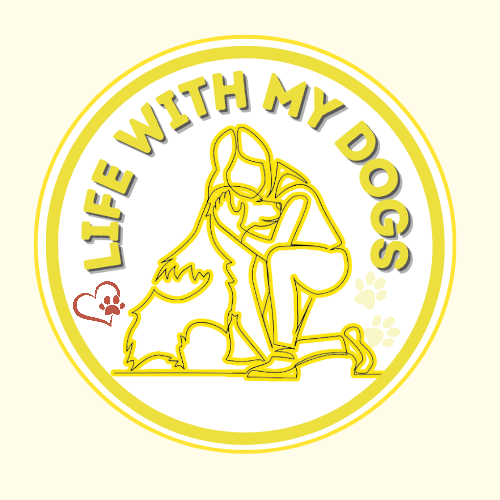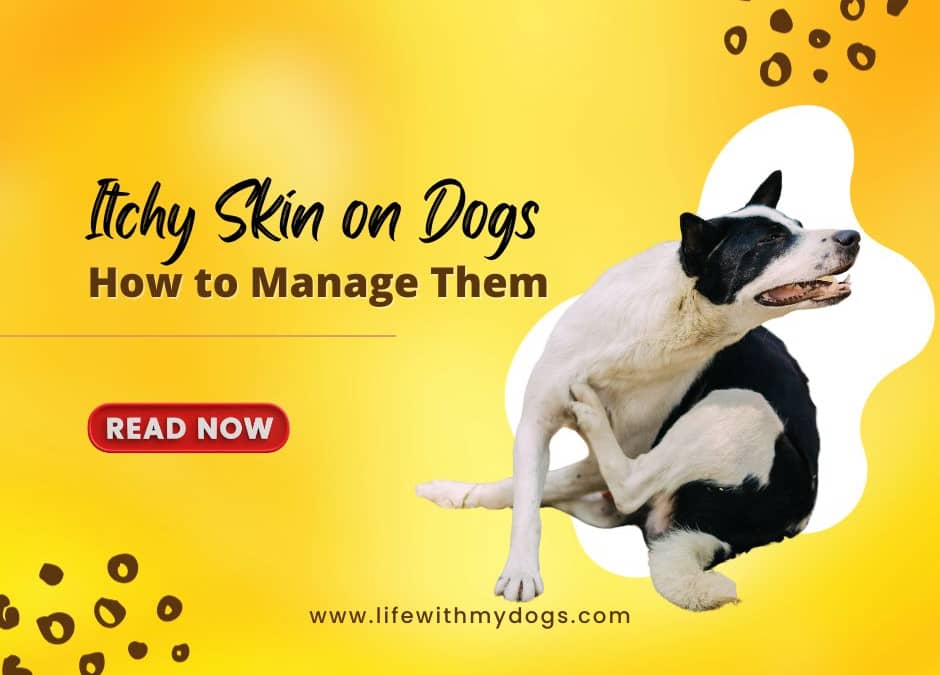LifeWithMyDogs is supported by our audience. When you purchase through one of our links, we may earn a small affiliate commission. As an Amazon Associate I earn from qualifying purchases. Your cost is not affected.
**********
A Comprehensive Guide to Soothing Your Dog’s Itchy Skin
It’s not uncommon to see your furry friend occasionally scratching their skin. However, if your dog scratches excessively, it might be a sign of itchy skin, leading to discomfort and distress.
This comprehensive guide to itchy skin on dogs will provide all the necessary information about the causes, prevention, and treatments for itchy skin.
Understanding Itchy Skin On Dogs
The medical term for excessive itching in dogs is pruritus. It’s the second-most common reason for vet visits, topped only by gastrointestinal issues. Dogs itch for two main reasons: skin conditions and food allergies.
Skin Conditions
Skin issues can be due to infections, dry skin infections, or oily skin. Dry skin is the most prevalent among these and can be recognized by dandruff in the fur and the skin appearing cracked and tough. Even the gentlest touch can cause your dog to scratch violently.
Allergies
Allergies form the second significant cause of pruritus. The aggressive vaccination protocols, poor breeding practices, and the feeding of processed pet foods have increased allergic cases. Although allergies are rarely cured, early identification and intervention can help control them and, in some cases, substantially reduce them.
Recognizing the Signs of Itchy Skin
In addition to frequent scratching, other symptoms may indicate that your dog suffers from itchy or skin disease. These include:
- Dry, greasy, or slightly dry and oily fur
- Frequent paw-licking or chewing
- Inability to get comfortable due to itching
- Loss of appetite
- Depressed mood
If your dog exhibits any of these symptoms, it’s crucial to seek immediate veterinary attention to prevent the development of open wounds, hot spots, or skin infections.
Home Remedies for Itchy Skin
While a visit to the vet is essential, several home remedies can provide temporary relief to your dog’s itchy and skin allergies:
1. Avoid Harsh Shampoo
When bathing your dog, consider using only water and a mild shampoo. Choose a shampoo that targets skin issues. To know what skin issues your dog has, a visit to the vet is a must. A mild shampoo faces little to no fragrance is a great way to lessen itchiness on a dog’s skin.
2. Use Aloe Vera
Aloe Vera is a potent healing agent known for reducing redness and drawing uncomfortable heat away from the skin. You can apply aloe vera gel directly to your dog’s affected areas. Please ensure that redness is reduced and removed when you use aloe vera products specifically designed for pets or ones that are pure and free from additives, preservatives, or harmful substances. Aloe vera gel or juice can be used, but avoid using products with added chemicals or fragrances.
Perform a patch test by applying a small amount of aloe vera on a small area of your dog’s skin. Monitor for adverse reactions like redness, itching, or swelling over the next 24-48 hours. Apply the diluted apple cider vinegar solution to your dog’s itchy skin using a clean cloth or cotton ball. Focus on the affected areas, avoiding the eyes, mouth, or open wounds.
3. Apply Apple Cider Vinegar
Apple cider vinegar can treat mild yeast infections on the skin. Mix apple cider vinegar and water in a spray bottle and spray your dog’s itchy spots with the solution. It can help relieve itching and restore the skin’s pH balance. You can perform a patch test by applying diluted apple cider vinegar on a small area of your dog’s skin.
Monitor for adverse reactions like redness, itching, or swelling over the next 24-48 hours. Allow the apple cider vinegar solution to air dry on your dog’s skin. Ensure your dog doesn’t lick the solution to prevent ingestion.
4. Offer a Balanced Diet
Diet can significantly impact your dog’s skin, hair loss, and health. Ensure your dog’s diet contains high-quality, easily digestible protein sources, such as chicken, turkey, fish, or lean beef. Adequate protein is crucial for skin and coat health. Consider feeding your dog moist food and adding digestive enzymes to their diet.
Always consult your veterinarian before making significant changes to your dog’s diet, especially if your dog is experiencing skin issues. A veterinarian can provide personalized recommendations based on your dog’s health history, age, breed, and any existing medical conditions.
5. Use Fish Oil
Fish oil, rich in omega-3 fatty acids, can help improve skin health and reduce body-wide inflammation. Before starting any supplement regimen, including fish oil, please consult your veterinarian to determine the appropriate dosage and ensure it suits your dog’s needs and health conditions.
Mix the recommended amount of fish oil with your dog’s regular food. You can administer it with their meal once or twice a day, depending on the dosage and your veterinarian’s instructions.
6. Prepare an Oatmeal Bath
Prepare an oatmeal bath by blending plain, uncooked oats into a fine powder and adding it to your dog’s bathwater. Let your dog soak in this bath for 10-15 minutes to soothe the itching. I use this as well to soothe my dry skin. An oatmeal bath is gentle and soothing to the skin without costing thousands of dollars.
I suggest using rolled oats instead of instant oatmeal since it’s less processed. Start with a lower dose initially and gradually increase it to the recommended dosage over several days to allow your dog’s digestive system to adjust. If you don’t observe any improvement in your dog’s skin condition or if the itchiness persists, consult your veterinarian to discuss adjusting the dosage or exploring alternative treatment options.
It’s important to remember that while fish oil can benefit many dogs, it may not work for every individual. If your dog has severe skin issues, allergies, or persistent itchiness, consult a veterinarian for a comprehensive evaluation and appropriate treatment plan.
7. Regular Dog Grooming
Regular grooming, including brushing and bathing, helps remove dirt, debris, allergens, and loose fur from your dog’s coat. This reduces the likelihood of skin irritation and itching caused by these substances.
When to Visit a Vet
If your dog’s itching remains the same or worsens, or if they experience broken skin from excessive scratching, it’s time to consult a vet. Depending on the cause, your vet may prescribe oral medications, medicated shampoos, prescription ointments, or other treatments to alleviate the underlying cause or treat itchiness.
Source: Doctor Lindsay Butzer DVM
Preventing Itchy Skin in Dogs
Prevention is always better than cure. Here are some ways to prevent itchy and skin diseases in dogs:
- Maintain a healthy diet: A well-balanced diet can improve your dog’s skin health and reduce the risk of itchy skin.
- Keep your dog hydrated: Always provide fresh, filtered drinking water to ensure your pup stays well-hydrated.
- Regular grooming: Regular grooming can help keep your dog’s skin and coat healthy, reducing the risk of skin conditions leading to itchiness.
Itchy Skin on Dogs: Last Few Words
Itchy skin can be a discomfort for your dog, but with the proper knowledge, treatment, and preventive measures, it’s a condition that can be managed effectively. Please consult your vet if you notice your dog itching or scratching excessively to ensure they get the appropriate treatment and care.
Remember, a happy dog is healthy, and maintaining their skin health is crucial to overall wellness.
FAQs
Why Is My Dog Constantly Scratching His Skin?
Dogs can experience itchiness due to various reasons, including allergies, flea infestations, dry skin, dermatitis, infections, or underlying health issues. It’s important to identify the root cause to relieve their itching effectively.
How Can I Determine the Cause of My Dog's Itching?
Consulting a vet is crucial to determine the cause of your dog’s itching. They may conduct tests, skin scrapings, or allergy tests to know the problem and suggest appropriate treatment.
How Can I Prevent My Dog From Itching in the Future?
Regular grooming, a healthy diet, flea control, maintaining a clean living environment, and addressing any underlying health issues promptly can help prevent or minimize itching in your dog.
When Should I See a Veterinarian for My Dog's Itching?
If your dog’s itching is persistent, or severe, or if they have additional symptoms like hair loss, redness, sores, or changes in behavior, consult a veterinarian promptly for a thorough evaluation and appropriate treatment.
Can Excessive Itching Be a Sign of a More Serious Health Issue in Dogs?
Yes, excessive itching can be a symptom of underlying health issues such as skin infections, hormonal imbalances, autoimmune disorders, or skin cancer. It’s essential to have your dog examined by a veterinarian to rule out serious conditions.
Always prioritize your dog’s well-being and consult a veterinarian for specific advice and treatment tailored to your dog’s needs.
?Learn How To Manage Itchy Skin on Dogs?
Facebook: Check our Facebook Page for all things dog-related and learn all the best dog-related things.
Instagram: Step into the world of furry adventures, wagging tails, and unconditional love! ? Join us on our daily journey filled with pawsitive moments, playful antics, and heartwarming cuddles. From wagging tails to happy trails, we’re here to share the joy that our four-legged family members bring into our lives.
Pinterest: ? Discover curated boards offering tips on training, pet care, DIY doggy projects, delicious dog-friendly recipes, and more. ? Dive into a world of wagging tails, sloppy kisses, and endless tail-wagging happiness. Follow us for a daily dose of doggy delight and join the pawsome LifeWithMyDogs community!
Twitter: Join us on a daily adventure of canine capers, playful romps, and heartwarming memories. From morning woofs to bedtime cuddles, we’re here to share the love and happiness our fur babies bring into our lives. ?







